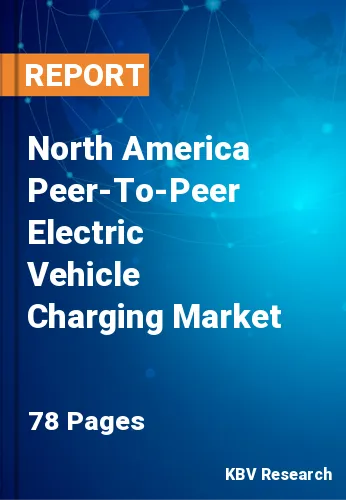The North America Peer-To-Peer Electric Vehicle Charging Market would witness market growth of 19.9% CAGR during the forecast period (2022-2028).
To broaden the scope of peer-to-peer electric charging solutions, many companies are focused on collaborations with utilities and energy corporations. For example, in January 2020, EVmatch announced a trial initiative with companies in the U.S. state of Vermont, such as Green Mountain Power and Burlington Electric Department, to create EV charging affordable and logical for multi-family dwellings. EV charging stations are also becoming more popular among apartment owners as a way to generate additional cash, recoup electricity bills, and attract new renters.
Governments around the world are focusing on providing subsidies for the establishment of peer-to-peer networks to overcome range anxiety issues associated with electric vehicles. The United States government, for example, has formed the Northeast Corridor Regional Strategy, which aims to encourage the integration and growth of peer-to-peer electric car charging networks and infrastructures. Peer-to-peer charging stations are being introduced by several businesses to boost consumer satisfaction
The increasing number of firms working in the peer-to-peer electric car charging industry across the United States is helping to drive up usage. Furthermore, makers of electric vehicle charging stations are concentrating on expanding collaborations with automobile manufacturers to deliver a seamless charging experience. For example, Tesla has installed 18 general populace charging stations in the state of California. The SF Bay Area Activities & Coalition has designated 109 sites where public charging stations will be constructed beginning in 2009, due to ARRA funds.
In May 2019, Transport Canada introduced a pan-Canadian EV rebate program, offering a $5,000 rebate toward the purchase of a new electric vehicle. In the second quarter of 2019, electric vehicle sales accelerated across Canada. However, in all markets, the rate of the additional sales did not last through the second quarter, implying that the lesser incentive amount may have a smaller or more transient impact than the $10,000 incentive previously offered in Ontario. EV sales in other Canadian markets with legislative incentive programmes increased marginally after the initial bump in the second quarter of 2019.
The US market dominated the North America Peer-To-Peer Electric Vehicle Charging Market by Country in 2021, and would continue to be a dominant market till 2028; thereby, achieving a market value of $85.3 million by 2028. The Canada market poised to grow at a CAGR of 22.6% during (2022 - 2028). Additionally, The Mexico market would display a CAGR of 21.6% during (2022 - 2028).
Based on Application, the market is segmented into Residential (Apartments and Private Homes) and Commercial (Destination Charging Station, Fleet Charging Station, Workplace Charging Station, and Others). Based on Charger Type, the market is segmented into Level 2 and Level 1. Based on countries, the market is segmented into U.S., Mexico, Canada, and Rest of North America.
Free Valuable Insights: The Global Peer-To-Peer Electric Vehicle Charging Market is Estimated to reach $363.4 Million by 2028, at a CAGR of 20.6%
The market research report covers the analysis of key stake holders of the market. Key companies profiled in the report include ChargePoint Holdings, Inc., Enphase Energy, Inc. (ClipperCreek, Inc.), Enel X Italia Srl (Enel Group), EVBox (Engie SA), EVmeter LTD., Shell Recharge Solutions (Shell plc), Innogy SE (E. ON SE), Power Hero, Inc., and Webasto Group.
By Application
By Charger Type
By Country
Our team of dedicated experts can provide you with attractive expansion opportunities for your business.

